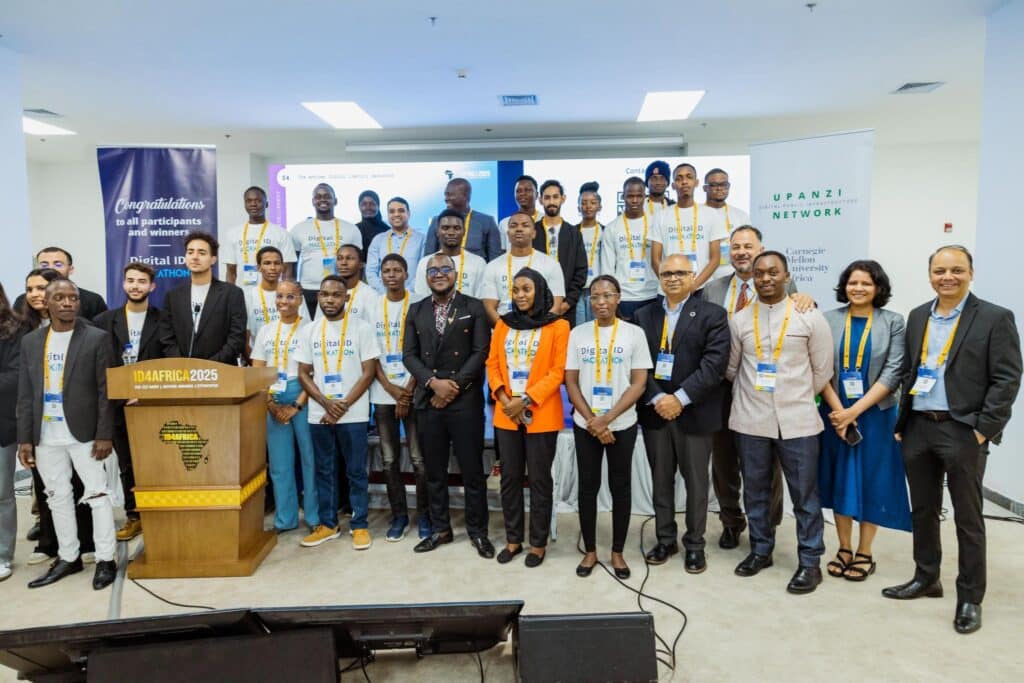Upanzi Network digital identity hackathons to continue nurturing African talent

The African Digital Identity Hackathon, organized by the Upanzi Network at Carnegie Melon University Africa in Rwanda and MicroSave Consulting, represented several firsts for ID4Africa when the winning teams presented their solutions on stage in Addis Ababa. The session brought the youngest group of attendees ever to join the AGM, shared ideas from outside of government and civil society groups for applying digital identity to the needs of Africa’s communities for the first time, and provided a platform for candidates to play future leadership roles in technical innovation.
Doing so was a risk for ID4Africa, says CMU Research Engineer Andrew Musoke, one of the hackathon organizers, in an interview with Biometric Update immediately following the presentation. He commends ID4Africa’s leadership for trusting in the value of contributions from African students.
The eight winning teams hailed from universities in Botswana, Malawi, Morocco, Rwanda, Togo and Senegal. Their involvement in the continental market cannot come too soon.
Musoke describes the involvement of Africa’s private sector in the event and the broader marketplace as dismal, noting that with the increase in exhibition booths for African businesses in recent years, “at least it’s a non-zero number.”
“There’s still a lot of work to be done,” he acknowledges, “and thankfully that is exactly what the digital ID hackathon is aid.”
Building foundations
The Upanzi Network started by accepting ideas. Musoke says this was decided in order to keep the barrier to entry as low as possible, in the hopes of building capacity among those who have interest in topic, not just those most technically skilled.
“We don’t put digital ID first, we put the problem first,” he explains. “So, we ask the general public: ‘what problems are you facing in your communities that you think could be improved or aided by the addition of digital identity if your country did have a digital identity system?’”
Later in the conversation, Musoke also reflects that the ID4Africa 2025 AGM shows a shift from taking technology as a starting point to beginning with people, which he sees as an encouraging sign, compared to the 2024 and 2023 events.
There were roughly 600 ideas submitted from all across Africa, 80 of which were selected based on their novelty, cost-feasibility for actual implementation and potential for impact. Submissions were accepted in any language, though Musoke says most were in English or French.
A team of about 20 volunteer mentors from civil society, academia, the public and private sector sifted through the 80 ideas to select 6 per region to advance to the prototyping stage. The selection was made all the more challenging by the vast range of issues being addressed, and the need to evaluate the importance of each to local and regional communities.
“You do hear it, but seeing it is a different issue; the most striking thing was the diversity of the ideas,” Musoke says.
Many of the most pressing issues in Rwanda are different from those in Morocco, he explains, leading to different ideas for ways to benefit people through digital ID.
The main change for the 2026 will be a more unified continental approach, Musoke says, instead of the regional one Upanzi Network took to bootstrap the inaugural competition. Part of that bootstrapping process involved identifying regional partners. With Universite Cheikh Anta Diop De Dakar in Senegal and Al Akhawayn University in Morocco on board to provide regional nuance, the hackathon will run from September to May for the entire continent at once.
Upanzi Network has also fielded requests to expand the hackathon to include innovators from the private sector, so Musoke says a separate division for them to compete in is under consideration.
There is a role for both, he believes, as the private sector participants are more likely to have the tools and resources to bring their ideas to production, while the students have the “uninhibited” freedom of thought to come up with the most surprising ideas.
Upanzi’s role is to vet the ambitions of the African participants and nurturing their talent, but Musoke says the ecosystem needs to help entice them to stay and apply their abilities to addressing the continent’s challenges.
“Once we identify this talent, there is a risk, as history has suggested, that it can escape the continent,” Musoke observes. “Brain drain is a real issue.”
“We’re talking internships, we’re talking entrepreneurial support,” and other opportunities, he says.
Upanzi has partnered with CMU Africa’s Industry Innovation Lab to help with business incubation, but more is needed in this area.
“At the end of the day, I would love to come to ID4Africa 2026 and find ten African companies that are building use cases and supporting government initiatives.”
Article Topics
Africa | African Digital Identity Hackathon | Carnegie Mellon University | CMU Africa Industry Innovation Lab | digital ID | digital identity | ID4Africa | ID4Africa 2025 | Upanzi Network







Comments